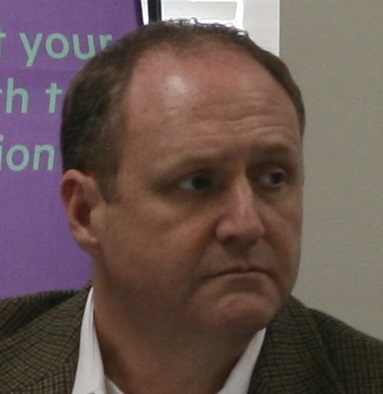By Bob Allen
While other missionary-sending bodies scale back or focus just on short-term assignments, a proposed restructuring of Cooperative Baptist Fellowship global missions recommits to keeping personnel on the field long enough to build the kinds of relationships they need to succeed.
 “We doubled down on a commitment to long-term presence,” Mike Oliver, chair of an ad hoc committee on global missions structure and staffing, reported Jan. 28 to the CBF Governing Board.
“We doubled down on a commitment to long-term presence,” Mike Oliver, chair of an ad hoc committee on global missions structure and staffing, reported Jan. 28 to the CBF Governing Board.
“We doubled down on the idea that we wanted to send field personnel that would be in places and contexts around the world for long periods of time,” said Oliver, senior pastor of Trinity Baptist Church in Madison, Ala. “We felt like that’s the most effective way to do global missions, when relationships are built.”
Oliver, former chair of a Missions Council formed separately from the Governing Board in a restructuring of CBF governance adopted in 2012, said one of the most noticeable changes in the plan is how the 25-year-old Fellowship plans to sustain its long-term commitment to cultivate reconciliation, witness in word and deed and transform individuals and communities around the world.
A new hybrid funding model breeds benefits of the job security of fully funded personnel with high-touch partner funding that personally connects individual missionaries with a particular church, circle of friends or family.
Under a restructuring plan for CBF global missions introduced at the Governing Board’s Jan. 28-29 meeting at First Baptist Church in Decatur, Ga., the salary, benefits, housing costs and children’s educational needs of all CBF field personnel will be funded by the CBF Offering for Global Missions.
The plan eliminates distinctions between fully funded missions personnel and those who raise their own support. It requires all field personnel to raise partner-funded support from “friends-and-family networks” to support their personal ministry operating budgets.
A third funding stream includes a capital funding campaign celebrating the CBF’s 25th anniversary in 2016. Half of those funds, which total $4.6 million just three months into the campaign’s silent phase, will go toward innovations like funding young adults and retirees to work alongside long-term personnel for a period of two or three years in part to help them discern if their calling is to go all-in for long-term service and enlisting global partners to help CBF churches reach refugee communities in their own backyard.
 CBF Global Missions Coordinator Steven Porter said before now, CBF Global Missions has never had a plan for sustainable growth.
CBF Global Missions Coordinator Steven Porter said before now, CBF Global Missions has never had a plan for sustainable growth.
The last eight years or so, Porter said, most growth in appointed personnel has been through partner-funded models. Prior to the 2008 recession, growth for several years was funded by a series of large, one-time, anonymous gifts. In the early years of CBF Global Missions, the budget was growing so fast that CBF could help any qualified missionary asking for support.
“We’ve never really figured out that sweet spot between attrition and appointment,” Porter said.
Discussions with field personnel has revealed strengths of both partner funding and the centralized approach of the Offering for Global Missions.
According to Oliver the group that is currently partner-funded said they love the relationships with friends and family back home. “Some of the OGM said we would like to have that too.”
People who have lived overseas a long time, Oliver said, don’t have that sense of connectivity.
“We felt like the partner-funded model would be a really good expression for all our field personnel to have the connection that they desire with our people back home.”
Porter said when invited to speak at a church, CBF field personnel will focus on promoting the global missions offering. “If a church initiates that ‘we would like specifically, in addition to OGM, to help you,’ then they can then talk about how they may join the family,” he said.
Paul Baxley, a Governing Board member who led an ad hoc committee to expedite implementation of strategies developed by the Missions Council, said the new funding plan brings clarity to CBF fundraising appeals.
“Because we will move from three or four classifications of field personnel to one, any field personnel who stands before any congregation to make an appeal on behalf of the Offering for Global Missions will be able to answer the following question the same way for the first time in a long time,” said Baxley, senior pastor of First Baptist Church in Athens, Ga. “The question is ‘How do the receipts from this offering support you?’”
